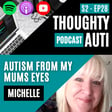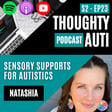
Autism Relationship Masterclass
What challenges do Autistic-Allistic relationships present? How can neurodiverse couples communicate better? What qualities do Autistic relationships need to be successful?
Mona Kay (@neurodiverse_love) is an ADHDer, podcaster, and relationship coach. Married for 30 years to an Autistic man, together for 32, but only aware they were a neurodiverse couple after the 29th year... after her divorce she started the Neurodiverse Love Podcast. Mona uses her experiences and knowledge to offer new and neurodiversity-affirming ways to improve relationships.
My Links - https://linktr.ee/thomashenleyUK // Mona's Links - https://linktr.ee/NeurodiverseLove
Dbud Noise Cancelling Adjustable Ear Buds (20% OFF with code: THOUGHTYAUTI) - https://dbud.io/thoughtyautipodcast
Mona kicks things off by speaking on the story of her marriage and eventual divorce from her Autistic spouse. She describes the ways she was unknowingly overwhelming her husband with her communication, flooding him to the point of shutdown.
Thomas and Mona discuss the common miscommunications that can happen between allistic and autistic individuals in relationships:
Not being concise or specific, overloading with emotion, lack of preparation, ignoring the need for social transitions, being aware of social batteries, pathological demand avoidance (PDA), ignoring sensory sensitivities, understanding of processing time, flat affect, and lack of direct emotional explanation.
They speak on the controversy of Cassandra Syndrome, and how this should be viewed as an issue of Double Empathy... before going on to highlight the general positives and negatives of Autistic relationships.
Dating a different neurotype will always come with more issues with communication if not properly addressed. Not understanding platonic vs romantic intent, issues around identifying flirting, different ideas about the boundaries of relationships, or even the relationship goals/milestones.
Mona speaks on the unique issues that can come with moving in together and not addressing each other's needs, the challenges of raising children, and the hidden issues that surface once children move out of the home. Thomas chips in with his experience of moving in with a partner and his desire for a partnership in the future.
Rounding up the episode, they converse about the qualities in yourself, your partner, and the relationship that lead to the best outcome:
Being self-aware of your non-negotiables, core values, and boundaries, having a growth mindset, patience, open-mindedness, low emotional reactivity, independent mindsets, curiosity, direct communication, and solid conflict resolution.
Song Of The Day (Listen Here) - https://open.spotify.com/playlist/5UDIyN5TSYN4zMcRoQPrG8?si=9255ed3480d840b5



















